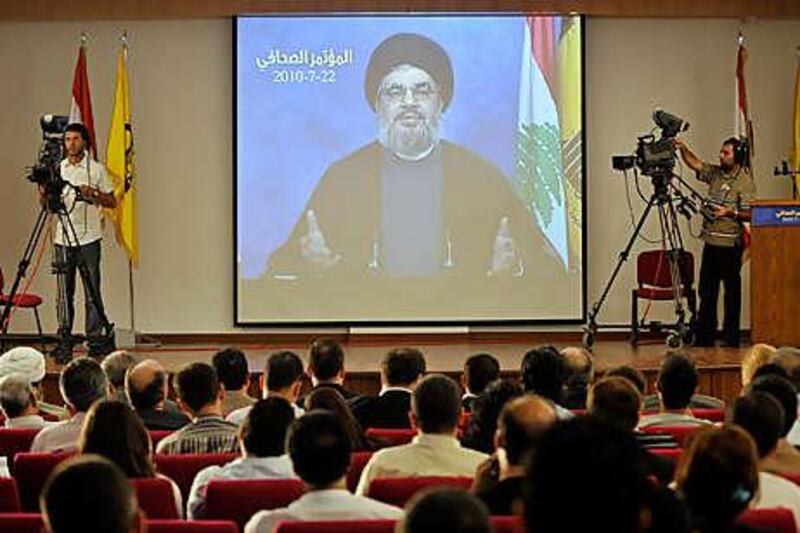BEIRUT // The potential indictment of Hizbollah members by an international tribunal investigating the 2005 murder of the former prime minister Rafiq Hariri will not cause widespread civil unrest in Lebanon, the current prime minister and son of the slain leader has said. Saad Hariri, in an interview published yesterday in the daily Al Hayat, also said any named suspects that may be members of Hizbollah will be regarded as rogue elements of the Shia militant group.
Mr Hariri made the statements in an effort to reassure the country that any indictments of Hizbollah members by the Special Tribunal for Lebanon would not lead to a return of sectarian violence between Sunni supporters of the Hariri family and the mostly Shiite supporters of Hizbollah. The prime minister was said to have informed the Hizbollah leader, Hasan Nasrallah, during a meeting in May that the indictments - expected later this year - would include several members of the Shiite militant group.
Mr Nasrallah revealed in a closely watched speech and press conference on Thursday evening that Mr Hariri had told him of the impending indictments. In the speech, Mr Nasrallah denounced the tribunal process as biased and chided Syria's opponents in Lebanon for jumping to conclusions about the murder of Hariri and destabilising the country from 2005 until 2008. The 2005 blast in downtown Beirut killed Hariri and 21 others and set a near civil war into motion, one that first saw Syria forced to end its three-decade-long occupation of Lebanon and later turned into violent clashes between the Sunni and Shiite communities of Beirut.
"I was personally informed by prime minister Saad Hariri before his visit to Washington [in May] that the tribunal will accuse some undisciplined members [of Hizbollah]," Mr Nasrallah said during the press conference. In keeping with his often-draconian security measures, due to fears he could be targeted by Israel, Mr Nasrallah spoke by video link to supporters and some journalists for Arabic-language media.
"That's where things seem to be heading," Mr Nasrallah said, calling the indictments "a dangerous plot that is targeting the resistance". "We are not at all afraid, nor are we worried. We know how to defend ourselves," he added. Mr Nasrallah, who spoke for about an hour and answered several questions, refused to discuss how Hizbollah will react should the indictments be issued. He confirmed for the first time that tribunal investigators had come to Lebanon this year to interview members of the group and said that, in his view, there was bias in their questioning, leading him to believe that not only were indictments a foregone conclusion but that the investigation had been held to target Hizbollah.
His argument ran counter to years of speculation and leaks from the tribunal that have led many Lebanese to think that the Syrian regime would be implicated in the 2005 truck bombing of Hariri's convoy. "All the data we have indicate that the charge sheet was written up before even the interrogation of our members," Mr Nasrallah said. "The indictment is ready [and] it is only a matter of political timing.
"As long as the probe does not look into the possibility that Israel is implicated, we believe it is biased," he said. "Never has the investigation considered the hypothesis that Israel had the means and the motive" to assassinate Hariri. The assassination sparked a political movement, later dubbed "March 14", led by Saad Hariri, and supported by a coalition of Sunni, Druze and some Christian parties opposed to Syria's influence.
The group won parliamentary majorities in 2005 and 2009. But it has since imploded with defections and in-fighting among its members in the wake of a 2008 cabinet decision to regulate Hizbollah's internal communications network. Hizbollah and its allies responded with an armed assault on Mr Hariri's supporters in West Beirut that killed scores of people and forced intervention by Arab states to help form a unity government to end the fighting.
Mr Nasrallah used his press conference to imply that the March 14 movement has been duped by the United States and Israel into an overreaction to Hariri's murder. He called on the movement to re-evaluate its positions now that it seems certain, he said, that Syria will not be directly accused in Hariri's murder. But March 14 leaders, at least among the Christian community, threw blame back at Mr Nasrallah, citing both the 2006 war with Israel, which was sparked by a Hizbollah operation to kidnap Israeli soldiers, and the 2008 takeover of West Beirut.
"We will not allow Sayyed Nasrallah to devastate the country like he did in July 2006 and in 2008," MP Nadim Gemayel warned. "Moreover, we will not allow any international ruling to cause internal strife." Mr Gemayel then described March 14 as a "Lebanese movement" and asked Mr Nasrallah whether he would like the group to adopt "Syria First or Iran First" as a new slogan, in a direct reference to the very close ties between those countries and the militant group.
mprothero@thenational.ae





